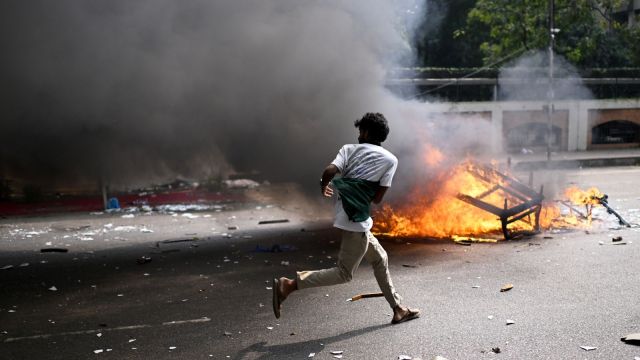Clashes break out in Bangladesh capital as major political parties sign a new charter
The protesters, numbering in the hundreds, identified themselves as relatives of those who died during last year’s mass uprising that led to the ouster of former Prime Minister Sheikh Hasina.
 A protester runs next to burning debris from a kiosk outside Bangladesh's national parliament complex in Dhaka, Bangladesh, Friday, Oct. 17, 2025. (AP Photo/Mahmud Hossain Opu)
A protester runs next to burning debris from a kiosk outside Bangladesh's national parliament complex in Dhaka, Bangladesh, Friday, Oct. 17, 2025. (AP Photo/Mahmud Hossain Opu)
Police in Bangladesh resorted to tear gas, stun grenades, and batons to break up protests outside the national parliament on Friday, as tensions escalated over the interim government’s newly unveiled political charter.
Demonstrators clashed with security forces, vandalising a police vehicle and makeshift tents, leaving several people injured, witnesses said. The protesters, numbering in the hundreds, identified themselves as relatives of those who died during last year’s mass uprising that led to the ouster of former Prime Minister Sheikh Hasina. They voiced frustration that their concerns were overlooked in the new charter.
The interim administration, led by Nobel Peace Prize laureate Muhammad Yunus, invited major political parties to endorse the charter Friday as part of a broader plan for political reforms. Among the signatories were the Bangladesh Nationalist Party, headed by former Prime Minister Khaleda Zia, along with eight allied parties, and sixteen other smaller parties, including several Islamist groups.
The nation’s largest Islamist party, Jamaat-e-Islami, initially hesitated but eventually signed the document, while four left-wing parties and a newly formed student group, the National Citizen Party, abstained.
Speaking outside the parliament, Yunus said the charter marked the beginning of a “new Bangladesh,” adding, “We have entered into a civilised society from barbarism.”
What is the new Bangladesh charter?
The “July National Charter,” named after the uprisings that began in July 2024, lays out a roadmap for constitutional amendments, new legal measures, and legislative reforms. The charter was drafted by a National Consensus Commission formed by Yunus’ government following consultations with 30 political parties. Hasina’s Awami League and former allies were excluded from the process.
Hasina, toppled in August 2024 after weeks of protests, remains in exile in India and faces trials in absentia on crimes against humanity charges. The United Nations has estimated that up to 1,400 people were killed during the uprisings.







